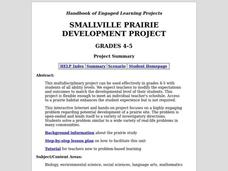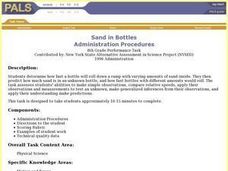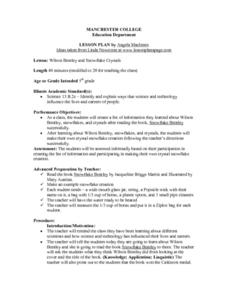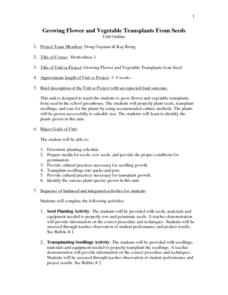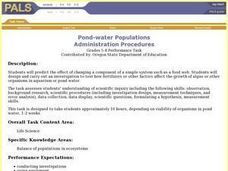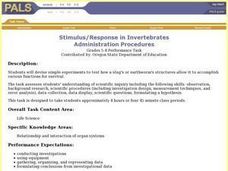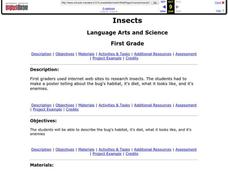Curated OER
Water Cycle
Third graders observe the changes that occur in the water cycle after doing a water cycle demonstration in a plastic bag. In this water cycle lesson plan, 3rd graders reflect on what they see and identify the stages.
Curated OER
Smallville Prairie Development Project
Students, through group activities, explain the important scientific, social/historical and aesthetic values of a prairie habitat. They analyze the impact of humans on prairieland and solve a problem regarding potential development of a...
Curated OER
Smallville Prairie Development Project
Students research the characteristics of the prairie habitat focusing on scientific, social/historical and aesthetic values. They investigate how humans impact the prairie habitat while maintaining a daily journal of research and...
Curated OER
Discovering the Problem of Solid Waste
Learners catagorize the types of garbage from going through a trash can provided by their teacher. They then chart the items on a graph and propose a solution to reduce the amount of garbage.
Curated OER
Cell Reviews
Students draw cells, make a cell, and list organelles in plant and animal cells. In this cells lesson plan, students create edible cells.
Curated OER
Magnifiers
Students describe how several different objects magnify a provided sentence and decide if they are good magnifiers or not. They then write a sentence describing two properties an object must have in order to be a good magnifier.
Curated OER
Density of a Sinker
Eighth graders determine the density of a sinker by first finding the mass and then the volume using a graduated cylinder. Students must write the procedure they use to find the volume of the sinker then apply their data to follow-up...
Curated OER
Sand in Bottles
Eighth graders calculate the speed of bottles as they roll down a ramp with varying amounts of sand inside. Using their data, 8th graders estimate speed of three labeled bottles with different amounts of sand and compare those results...
Curated OER
Ocean Life
Pupils research and identify ocean animals characteristics and life styles using the Internet and books. They create a PowerPoint presentation and an iMovie to present to the class.
Curated OER
Wilson Bentley and Snowflake Crystals
Fifth graders read the book, 'Snowflake Bentley' by Jacqueline Briggs Martin. They gather and make a list of information about snowflakes and crystals. Then they make their own real crystal snowflake creation and observe the crystals...
Curated OER
Growing Flower and Vegetable Transplants From Seeds
Students grow flower and vegetable transplants from seed in the school greenhouse. They properly plant seeds, transplant
seedlings, and care for the plants by using recommended culture methods. In addition, they identify the various...
Curated OER
Disorders of the Brain
Students, in groups, conduct research about a specific disorder of the brain, create a character study of a person with that brain disorder, and then present the information to the rest of the class.
Curated OER
TE Activity: Stream Consciousness
Fourth graders study how environmental engineers monitor water quality. They use environmental indicators to determine the quality of stream water in their area. They count the number of macroinverabrates and use the information they...
Curated OER
Unknown Liquids
Students must design and conduct an experiment to determine which unknown liquid has a greater density based on basic information about the liquids and containers. Students are given specific materials to work with.
Curated OER
Pond-water Populations
Students design and conduct and experiment on algae, for a two week period, to answer the question "In your investigation, how does changing one factor affect the growth of organisms?"
Curated OER
Stimulus/Response in Invertebrates
Students design and conduct and experiment to determine how invertebrates react to an outside stimulus such as light and other stimuli. Student must develop a clear plan of action, collect data in an organized manner and analyze their...
Curated OER
Coffee Cooling
Pupils explore the factors that affect how long coffee stays hot. They develop a question and a testable hypothesis for one factor such as initial temperature or size of opening of the container. Then they design and conduct an...
Curated OER
How Effective is Perspiration at Cooling?
Students collect data on the cooling of water in two different test tubes, one that is wrapped in wet newspaper and one in dry newspaper. They then relate this cooling effect to the body's perspiration.
Curated OER
Exploring the MapleCopter
Study explore the motion of maple seeds and design experiments to explain their spinning flight patterns. They make observations, explain ideas of motion, use models, analyze previous reports and experiments, identify relevant factors...
Curated OER
Heating Crystals
Learners examine the effects of heating on various crystals. They formulate and revise scientific explanations and models using logic and evidence. Students work individually during this experiment.
Curated OER
Are Fruits And Vegetables Really Made of Cells?
Students design and carry out an exercise to determine if a given fruit or vegetable is composed of cells. They dissect out sections of the fruit or vegetable, prepare stained slides, and make observations under a compound microscope.
Curated OER
Tadpoles
Young scholars examine tadpoles at various stages of development. They make careful scientific observations and compare the changes that occur at five different phases of a frog's life.
Curated OER
Insects
First graders view internet web sites, books and printed sources to research insects. They make a poster telling about the bug's habitat, it's diet, what it looks like, and it's enemies.
Curated OER
Focus on Friction
The students learn about friction and forces through direct instruction and an investigation. They use measurement skills, observation skills, predicting, and drawing conclusions based on data collected during the investigation. Students...



